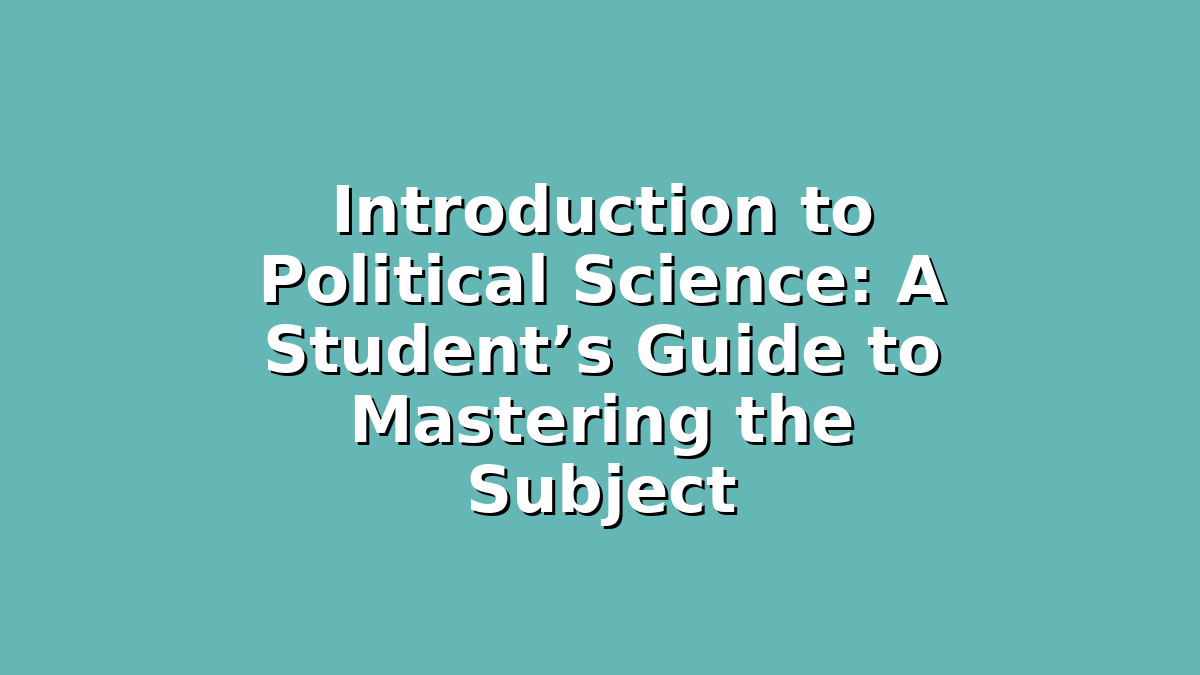Political Science is a fascinating and dynamic field of study that explores the theory and practice of politics, government systems, and public policies. Whether you are preparing for exams in high school, college, or competitive exams, understanding political science can feel overwhelming at first. However, with the right approach and study techniques, you can not only grasp the subject but also excel in it.
In this article, we will provide a comprehensive introduction to political science tailored specifically for students preparing for exams. We will break down the core concepts, suggest effective study strategies, and offer tips to help you retain information and perform confidently. Let’s get started!
What is Political Science? Understanding the Basics
Political science is the systematic study of political institutions, processes, behaviors, and ideologies. It examines how governments operate, how laws are made, how power is distributed, and how citizens engage with political systems. The subject typically covers a wide range of topics, including:
– Political theories and ideologies (like democracy, socialism, liberalism)
– Structure and functions of government (executive, legislature, judiciary)
– Electoral systems and political parties
– International relations and diplomacy
– Public policy and administration
For students, mastering these topics is crucial because exams often test your understanding of both theoretical concepts and practical scenarios. To begin, focus on building a strong foundation with key definitions and frameworks. Create concise notes or flashcards for terms like sovereignty, separation of powers, checks and balances, and types of government systems.
Section 1: Effective Study Techniques for Political Science
Political science involves memorizing facts, understanding concepts, and applying analytical thinking. Here are some proven study methods to help you succeed:
1. Break Down the Syllabus
Political science syllabi can be dense, so divide the content into smaller, manageable sections. For example, allocate specific days to study political theories, government institutions, and international relations separately. This focused approach prevents burnout and improves retention.
2. Use Visual Aids
Diagrams, flowcharts, and mind maps are excellent for visual learners. For instance, a flowchart illustrating the legislative process or a mind map outlining various political ideologies can make complex ideas easier to comprehend and recall.
3. Practice Answer Writing
Exams often require you to write structured answers explaining political concepts or evaluating political events. Practice writing short essays or paragraph answers under timed conditions. This will boost your ability to organize thoughts clearly and present arguments effectively.
4. Stay Updated with Current Affairs
Political science is closely linked to real-world events. Reading newspapers, watching news debates, or following credible online sources can enhance your understanding of how political theories apply in practice. Moreover, current affairs questions commonly appear in exams.
5. Discuss and Debate
Engage with classmates or study groups to discuss political ideas. Debating topics like democracy vs. authoritarianism or the role of the judiciary nurtures critical thinking and deepens your grasp of the subject matter.
Section 2: Key Concepts to Focus On for Exam Preparation
Knowing which topics are frequently tested can help you prioritize your study time. Here are some core areas students should focus on:
1. Political Theories and Ideologies
Understand the main political ideologies such as liberalism, conservatism, socialism, communism, and feminism. Know their origins, key thinkers, and how they influence political systems.
2. Constitution and Government Structure
Study the constitution of your country (if applicable), fundamental rights, directive principles, and the roles of different government branches. Focus on concepts like federalism, parliamentary vs. presidential systems, and judicial review.
3. Democracy and Electoral Systems
Learn how democracy functions, different electoral systems (first-past-the-post, proportional representation), and the significance of political parties and pressure groups.
4. International Relations
Familiarize yourself with basic terms like sovereignty, diplomacy, international organizations (UN, NATO), and major theories in international relations (realism, liberalism).
5. Contemporary Issues
Keep an eye on current political movements, major policy debates, and landmark court rulings, as these often feature in exam questions.
To make these concepts stick, try teaching them to someone else or writing summaries in your own words. This helps reinforce your learning and identify any knowledge gaps.
Section 3: Exam Day Tips and Maintaining Motivation
Studying political science can sometimes feel monotonous, but staying motivated is key to success. Here are some tips to keep your spirits high and perform well during exams:
1. Create a Timetable and Stick to It
Consistency beats cramming. Set realistic daily or weekly study goals and reward yourself when you achieve them. This builds discipline and reduces last-minute stress.
2. Revise Regularly
Don’t just study once — revisit your notes multiple times before the exam. Use spaced repetition techniques to improve long-term memory.
3. Practice Past Papers and Sample Questions
Attempting previous years’ question papers familiarizes you with exam patterns and helps you gauge your preparation level. Analyze your mistakes and work on weak areas.
4. Stay Positive and Manage Stress
Political science is challenging but don’t let anxiety hold you back. Practice deep breathing or mindfulness to stay calm. Remind yourself of your progress, and approach the exam with confidence.
5. Take Care of Your Health
Good sleep, balanced nutrition, and short breaks during study sessions can improve concentration and energy levels. Avoid all-nighters close to the exam date.
Conclusion
Political science opens a window to understanding how the world is governed and how societies function. For students preparing for exams, mastering this subject requires a strategic approach—breaking down complex topics, practicing active recall, staying updated with current affairs, and maintaining a positive mindset.
Remember, every expert was once a beginner. With diligent effort and the right methods, you can excel in political science and gain insights that will serve you well, both academically and personally. Keep your curiosity alive, stay organized, and don’t hesitate to seek help when needed. Good luck!

Responses